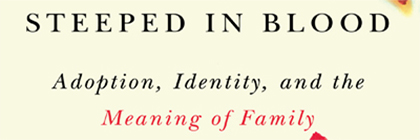A new book released this month by Frances J. Latchford, York University associate professor of philosophy, questions the idea of knowing whether one’s bio-genealogy is integral to personal identity or a sense of family and belonging.
Steeped in Blood: Adoption, Identity, and the Meaning of Family (McGill-Queen’s University Press) explores what personal truths reside in biological ties that are absent in adoptive ties, and asks why we think adoptive and biological ties are essentially different when it comes to understanding who we are.
 The book is a timely exploration of these themes at a time when interest in DNA and ancestry is exploding.
The book is a timely exploration of these themes at a time when interest in DNA and ancestry is exploding.
Latchford, who researches and teaches in the Faculty of Liberal Arts & Professional Studies (LA&PS) in the School of Gender, Sexuality and Women’s Studies, focuses her research in feminist social and political philosophy informed by continental, psychoanalytic, poststructural, (post)colonial, queer and transgender theories of subjectivity, identity, sexuality, sex and gender, race and ability.
This book upends established values and beliefs about what makes a family, and examines the social and political devaluation of adoptive ties. It takes readers on an intellectual journey through accepted wisdom about adoption, twins, kinship and incest, and challenges naturalistic and individualistic assumptions about identity and the biological ties that bind us, sometimes violently, to our families. Latchford exposes how the desire for bio-genealogical knowledge, understood as it is by family and adoption experts, pathologizes adoptees by posing the biological tie as a necessary condition for normal identity formation. Rejecting the idea that a love of the self-same is fundamental to family bonds, her book is a reaction to the wounds families suffer whenever they dare to revel in their difference.
A rejoinder to rhetoric that defines adoptees, adoptive kin and their family intimacies as inferior and inauthentic, Steeped in Blood‘s view through the lens of critical adoption studies decentres cultural obsession with the biological family imaginary and makes real the possibility of being family in the absence of blood.


